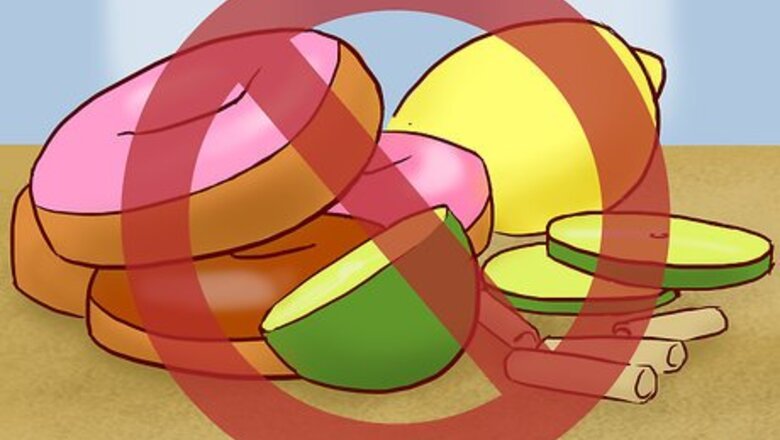
views
X
Trustworthy Source
University of Rochester Medical Center
Leading academic medical center in the U.S. focused on clinical care and research
Go to source
Experts agree that tooth decay leads to dental problems, including cavities, sensitivity, and pain.[2]
X
Trustworthy Source
Cleveland Clinic
Educational website from one of the world's leading hospitals
Go to source
Fortunately, you may be able to strengthen your tooth enamel with diet and lifestyle changes. However, visit a dentist if you suspect you have a cavity or have a damaged tooth to learn about your treatment options.
Taking Action to Reverse Enamel Loss
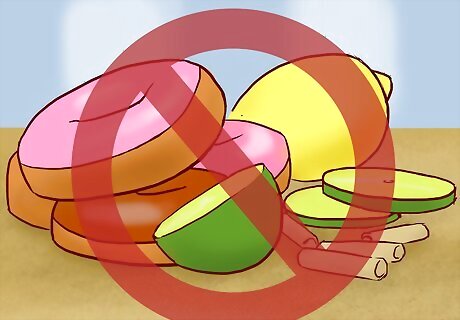
Regulate what you eat and drink. Avoid the sugary, starchy, and acidic foods and drinks are those most likely to create the bacteria on your teeth that becomes acidic and attacks tooth enamel. This bacteria can cause the discoloration, sensitivity, and roughened teeth that are hallmarks of enamel loss.

Improve your nutritional intake. Your body can strengthen weak enamel itself if given the necessary nutrients and minerals. Dark leafy vegetables, dairy, and protein-rich foods contain necessary nutrients. Drink water rather than soda or fruit juice.
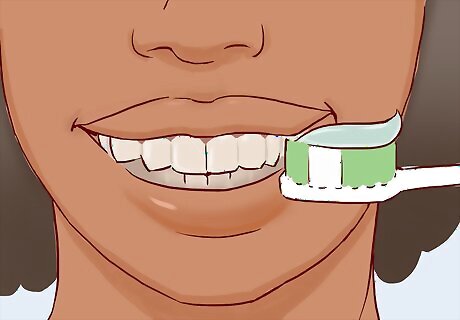
Include fluoride and enamel-hardening toothpaste or mouthwash in your oral hygiene routine. Fluoride can be in the form of drinking fluoridated water (most drinking water in the U.S. contains fluoride). It could also be in fluoridated toothpaste or mouthwash.Brush your teeth properly with a soft-bristled toothbrush in a brisk circular motion for 2 minutes. EXPERT TIP Pradeep Adatrow, DDS, MS Pradeep Adatrow, DDS, MS Board Certified Dentist & Oral Surgeon Dr. Pradeep Adatrow is the only board certified Dentist, Periodontist, and Prosthodontist in the southern United States. With over 15 years of experience, Dr. Adatrow specializes in dental implants, TMJ treatments, periodontal plastic surgery, surgical and non-surgical periodontics, bone regeneration, laser treatments, and soft tissue and gum graft procedures. He received a BS in Epidemiology and Biostatistics from the University of Alabama and earned his Doctor of Dental Surgery (DDS) degree from the University of Tennessee College of Dentistry. Dr. Adatrow then completed a three-year postgraduate program in periodontics and implantology at Indiana University and went on to complete another three-year postdoctoral program in advanced prosthodontics from the University of Tennessee. He also serves as a full-time professor and the Director of Surgical Prosthodontics at the University of Tennessee. Dr. Adatrow received the Dean's Junior Faculty Award and the John Diggs Faculty Award, and he was inducted into the Deans Odontological Society. He is board certified by the American Board of Periodontology and is a Fellow of the prestigious International College of Dentistry – a feat that only 10,000 others worldwide can claim. Pradeep Adatrow, DDS, MS Pradeep Adatrow, DDS, MS Board Certified Dentist & Oral Surgeon Fluoride strengthens protective enamel. Your enamel is a super shield protecting your teeth from decay. Its strength comes from fluoride, a natural mineral. Fluoride amps up enamel to resist acid attacks from food and drinks. It also helps rebuild lost minerals, restoring resilience. Use a fluoride toothpaste and ask your dentist about treatments to reinforce your enamel against decay.
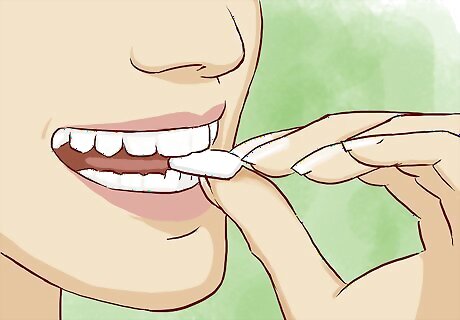
Chew sugar-free gum. The gum promotes saliva production, without the sugar that makes weakened enamel worse. Gum with the natural sweetener xylitol doesn't feed the bacteria that weakens your enamel, and xylitol has actually been shown to strengthen tooth enamel.
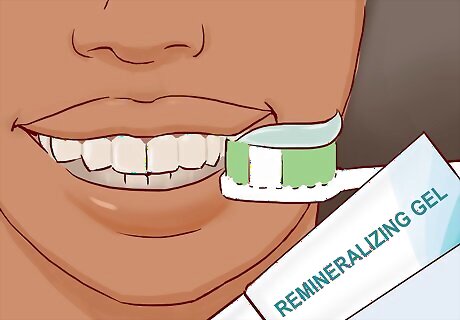
Add remineralizing treatments to your oral hygiene routine. Remineralizing gels with calcium phosphate and fluoride have been scientifically proven to help remineralize tooth enamel. Some dentists offer in-office remineralizing treatments or you can do it at home. You can brush remineralizing gel on your teeth if it comes in a pen or you can put it in teeth whitening trays and apply it to your teeth. This is the best way to cover all surfaces of your teeth.
Seeking Help from Dental Professionals
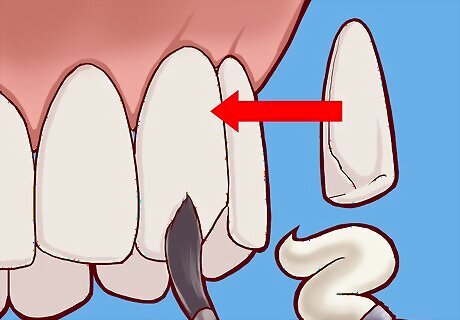
Explore whether tooth bonding would work for you. Tooth bonding might be necessary if your teeth are very rough and discolored. This procedure will smooth and whiten the teeth. This helps them blend in with the teeth around them. Tooth bonding is easier and less costly than getting either a veneer or a crown on your tooth to repair it.
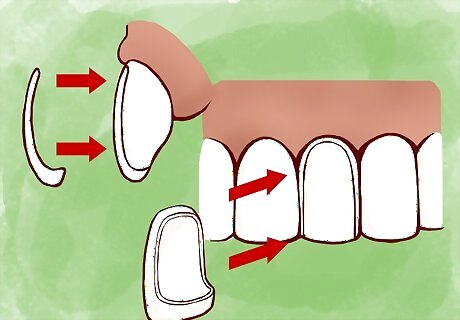
Inquire about veneers. Applying veneers are another option for rough and discolored teeth. A dentist will create a custom-made shell, or veneer, to cover the front of your tooth. The veneer is then bonded to the tooth itself, creating a smooth white surface to repair the affected tooth.
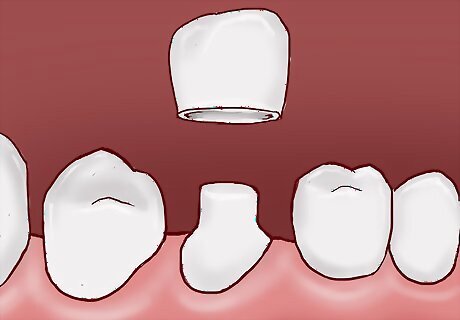
Ask your dentist if you need a crown. Fitting a crown might be necessary to cover and seal the entire tooth to save it if you are suffering from extreme enamel loss. Crowns, like veneers, are custom-made for the patient's tooth. The crown will cover the exposed dentin to prevent infection and act as the enamel did, smoothly protecting the tooth.
Addressing the Causes of Weak Tooth Enamel

Make sure you are producing enough saliva. Dry mouth can lead to weakened tooth enamel. Saliva helps prevent demineralization, and chronic dry mouth is caused by reduced saliva production. Even if you do not suffer from chronic dry mouth, antihistamines, medication, and even wine reduce saliva production. Components in saliva actually maintain and repair your enamel, so dry mouth can be damaging to tooth enamel. An autoimmune disease called Sjorgren's disease is frequently associated with having a dry mouth. If you frequently have a dry mouth and dry eyes, see your doctor to get you checked for Sjorgren's disease. You might also have joint pain, swelling, and stiffness; swollen salivary glands; skin rashes or dry skin; vaginal dryness; dry cough; and fatigue.

Monitor stomach-related illnesses. Acid reflux, bulimia, and celiac disease all put you at increased risk for tooth enamel loss. Acid reflux causes stomach acid to travel up your esophagus and even into your mouth. Those who suffer from bulimia make themselves vomit, subjecting their teeth to stomach acid. In both cases, the acid burns away tooth enamel, so make sure any acid reflux condition is under control whether through diet or medication. The reasons for tooth enamel problems among those who have celiac disease are still unclear, but the majority of those with the illness have accompanying tooth enamel problems.
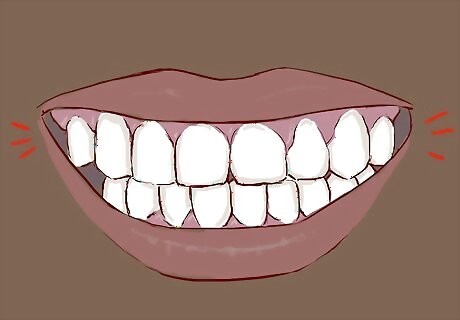
Check to make sure your teeth are not under stress. Grinding and biting can create an enormous strain on your teeth, leading to the possibility of enamel loss. Many people grind their teeth as they sleep and do not even realize it. A night guard for your teeth may help prevent the wear and tear caused by grinding.



















Comments
0 comment